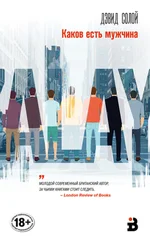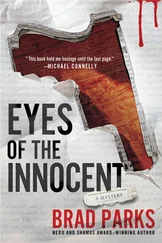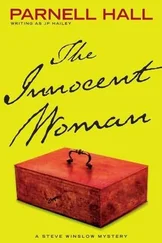Дэвид Салой - The Innocent
Здесь есть возможность читать онлайн «Дэвид Салой - The Innocent» весь текст электронной книги совершенно бесплатно (целиком полную версию без сокращений). В некоторых случаях можно слушать аудио, скачать через торрент в формате fb2 и присутствует краткое содержание. Город: London, Год выпуска: 2010, ISBN: 2010, Издательство: Vintage, Жанр: Проза, на английском языке. Описание произведения, (предисловие) а так же отзывы посетителей доступны на портале библиотеки ЛибКат.
- Название:The Innocent
- Автор:
- Издательство:Vintage
- Жанр:
- Год:2010
- Город:London
- ISBN:9781448103232
- Рейтинг книги:5 / 5. Голосов: 1
-
Избранное:Добавить в избранное
- Отзывы:
-
Ваша оценка:
- 100
- 1
- 2
- 3
- 4
- 5
The Innocent: краткое содержание, описание и аннотация
Предлагаем к чтению аннотацию, описание, краткое содержание или предисловие (зависит от того, что написал сам автор книги «The Innocent»). Если вы не нашли необходимую информацию о книге — напишите в комментариях, мы постараемся отыскать её.
The Innocent — читать онлайн бесплатно полную книгу (весь текст) целиком
Ниже представлен текст книги, разбитый по страницам. Система сохранения места последней прочитанной страницы, позволяет с удобством читать онлайн бесплатно книгу «The Innocent», без необходимости каждый раз заново искать на чём Вы остановились. Поставьте закладку, и сможете в любой момент перейти на страницу, на которой закончили чтение.
Интервал:
Закладка:
Ever since then I have wondered what happened to Blyakhman’s wife. It is true that thirty-seven took innocent men and women – perhaps she was one of the innocent, perhaps not. Yet it still left Rightists in place throughout the state and party organisations. Why did this happen? I don’t know. I was not in a position to know. Perhaps we simply stopped short, lost our nerve, lacked the historical will to press home the purge. Epshteyn understood the importance of historical will. The New Economic Policy of the twenties he saw as a surrender to petit bourgeois elements of the peasantry, as a failure of nerve, which particularly infuriated and depressed him because, as he told us, all previous social revolutions had failed because they had paused, moderated, lost their nerve. When he spoke of the stubbornness of parts of the peasantry, I thought of my own father. He was truly, as Epshteyn said, petit bourgeois in his mentality. A true kulak – proud to be the pike who swallowed the carp, and intractable as the frozen winter soil. ‘The world is strong like water,’ he said, ‘and stupid like a pig.’ That was his philosophy. It still saddens me to think of it. Why did he not understand? He was a victim of history. And history was his victim too. If instead of stubbornly obstructing he, and millions like him, had joined willingly in what had to be done, innumerable lives would have been saved. As it was, their stubbornness led to strikes and violence in the cities, where the food shortages were severe, and forced Lenin to introduce the NEP. And this would stay in place, and Epshteyn would fulminate against it, until the end of the decade, when the problem of the kulaks would be dealt with once and for all, as he had always insisted that it should be.
Communism is not violent. It is humane. To say that Communism is humane is to state the obvious, is self-evident. However, for Communism to be humane, it is first necessary to liquidate those elements that are implacably hostile to it, and since they will fight to preserve themselves and their social order – and why would they not? – this will inevitably involve violence. Epshteyn knew this very well. He had fought, and lost his arm, in the Civil War, and the flat left sleeve of his jacket might have been the subject of mockery. Other teachers were shown no mercy. For some reason, however, there was never any question of mocking Epshteyn, or even of mentioning it, unless he mentioned it first – which he sometimes did, with wry humour. He was tough, soldierly and erudite. We imitated his simple, emphatic way of speaking, the words he used, his way of smoking, of lighting a match with one hand. This was especially true of the more intellectually-minded of us in our final years at the school – the ‘Epshteynites’ as we were jokingly known. He impressed on us that even after victory in the Civil War, the Revolution was unfinished, that in fact the struggle for a more just world had hardly begun, and that it would be for us to ensure that it was seen through.
On Monday I went to see Gasselblat, head of the health secretariat of the oblispolkom. His office was on 1905 Square. He himself was middle-aged and nervous. He had a stutter. I told him that there was a man, Mikhail Naumovich Lozovsky, the director of a small hospital and medical institute, who had been identified as a security threat and should be moved. Gasselblat nodded. He wrote down the words ‘Lozovsky’ and ‘Metelyev Log’. ‘Understood,’ he said.
I suggested Dyomkin as a suitable successor, ‘though of course that’s up to you.’
‘Of course.’
I thanked him and left. When I got back to the office, I phoned Mikhalkov and told him what had happened. ‘Fine,’ he said. ‘Well done.’ And that seemed to be that. Unfortunately, it wasn’t. A few days later Gasselblat phoned me. He said, ‘Listen, there’s been a p –, a p –, a problem.’
‘What problem?’
The problem, he said, was that Lozovsky’s post at Metelyev Log was on the nomenklatura. This was surprising – it seemed a very minor, unimportant post to be on the list. What it meant, of course, was that it was not possible to move Lozovsky without the say-so of the obkom.
‘Well,’ I said, impatiently, ‘have you spoken to them?’
‘Yes.’
‘And?’
‘First they said, “Fine, fine.” Then I didn’t hear from them for a few days. And when I phoned them this morning, to find out what was happening, they said I should just leave it. I don’t know,’ he said sadly. ‘Maybe you should speak to them.’
When I told Mikhalkov, he was impatient, irritated. ‘What’s the problem?’ he said. ‘Why won’t they move him?’
‘I’m not sure.’
‘Well have you spoken to them?’
I told him I hadn’t.
‘Why not?’
I said that I didn’t know who I should speak to.
He sighed, unimpressed. An hour later, he phoned me back. ‘Suvorov,’ he said. ‘Speak to Suvorov.’
‘Suvorov?’
When he hung up, I sat there for a few moments staring at the phone. I had hoped he would speak to the obkom himself. It was an intimidating thing for me, for someone in my position, to have to do.
7
‘HE’S WITH ME,’ Ivan says to the old man with the nicotine-stained forelock, suited like an undertaker, on the entrance of the First Department of the Turkish baths. Aleksandr no longer has access to the First Department except when Ivan signs him in. The old man waves them through with his cigarette and they start up the wide wheaten marble stairs. ‘How’s things?’ Ivan says. ‘Over the disappointment of the football yet?’
‘I think so.’
‘It wasn’t just that we lost. It was the way we …’ He stops, in mid-sentence, to talk to someone on their way down – a man in late middle age with a heavy, sensuous face and very short grey hair. Ivan is not obsequious, not at all. However, he is highly, suavely solicitous. And he does all the smiling. The other man does not smile. Aleksandr, who stopped several steps up from them, is only able to hear snatches of their talk.
‘Do you know who that was?’ Ivan whispers, joining him.
‘No.’
‘Kantorovich.’ Still in a whisper.
‘Who’s Kantorovich?’ Not in a whisper.
Ivan looks quickly over his shoulder. ‘Colonel-General Kantorovich,’ he says in a low voice. ‘Strategic rocket forces. Took part in the arms-limitation talks in Moscow last month. Met Nixon.’
‘Oh yes?’
‘Yes.’
‘Proud of that, is he?’
‘I think so. I would be.’
‘What, of meeting Nixon?’
‘No, of taking part in the talks. Not that it wouldn’t be interesting to meet Nixon.’
They undress in the panelled warmth of the predbannik , the locker-room, and then proceed to the low light of the banya , where men, mostly middle-aged or older, sit or sprawl saggily on the wood shelves, some wearing wet flannel hats and mittens, otherwise naked, shining with sweat, flicking the sweat out of their eyes. No one speaks in the banya . The heat there is too intense for idle talk. There are only occasional short sighs. Aleksandr watches the drops of sweat slide over the sphere of his belly, the sweat-beaded backs of his hands. Yes , he thinks, we have surrendered. Surrendered on Berlin, on Germany, on our strategic rocket forces, on everything. The surrender started with Khrushchev, of course. When Khrushchev took power, he immediately put in place policies which he knew would undermine the Soviet system. Why was he not stopped? Simple. He knew that only the MGB had the power to stop him, so his first step was to neutralise the MGB. In this, he had the support of the many Rightists who were still in senior positions in the state and party – men who had not been liquidated in thirty-seven or later, and who had long been waiting for their moment to seize power. What they wanted was an abandonment of the struggle, the struggle towards Marx’s ideal of a society in which the wholeness of every human life is fulfilled. Loss of idealism. Yes. Idealism was lost, leaving nothing. Khrushchev’s peasant materialism. Brezhnev’s militarism. In the end we lost. Lost the ideal of moving towards Communism. In people’s minds. That was the essential thing. To move towards it in people’s minds. We did not work hard enough to do that. So the Rightists won, and 1937 did not destroy them. They were the people who supported Khrushchev, the people we failed to liquidate in the thirties and forties …
Читать дальшеИнтервал:
Закладка:
Похожие книги на «The Innocent»
Представляем Вашему вниманию похожие книги на «The Innocent» списком для выбора. Мы отобрали схожую по названию и смыслу литературу в надежде предоставить читателям больше вариантов отыскать новые, интересные, ещё непрочитанные произведения.
Обсуждение, отзывы о книге «The Innocent» и просто собственные мнения читателей. Оставьте ваши комментарии, напишите, что Вы думаете о произведении, его смысле или главных героях. Укажите что конкретно понравилось, а что нет, и почему Вы так считаете.












